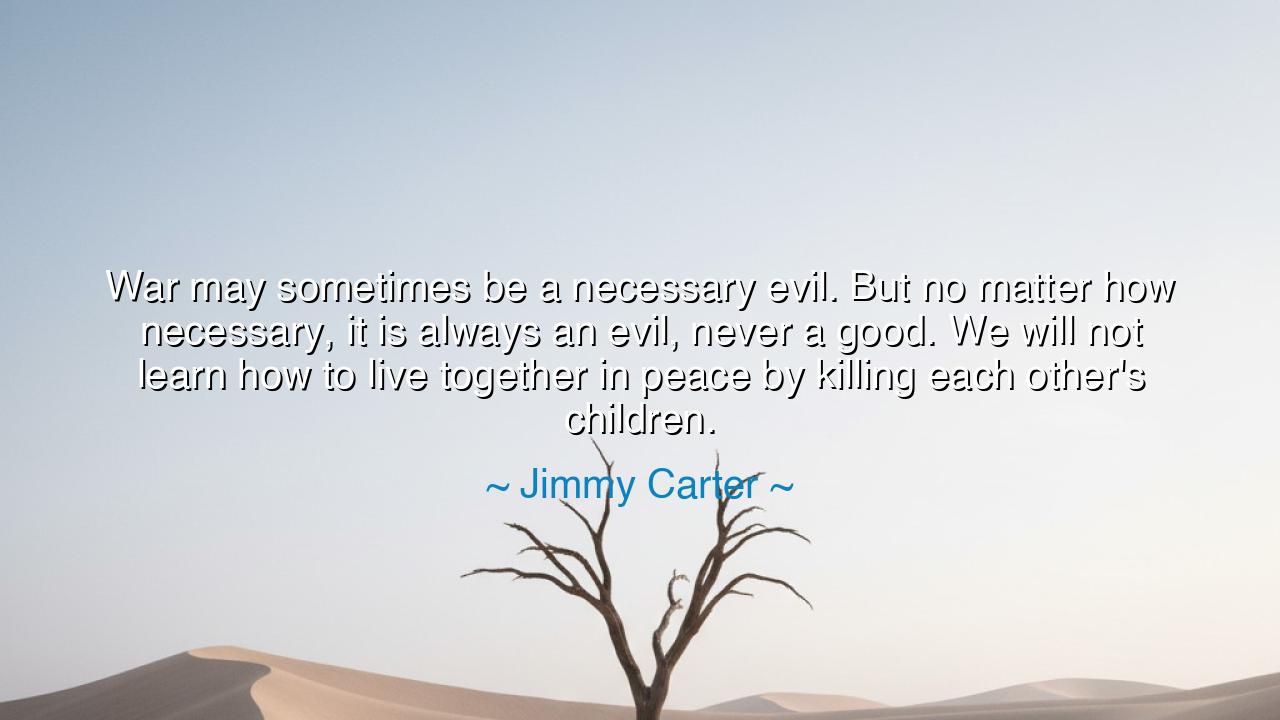
War may sometimes be a necessary evil. But no matter how
War may sometimes be a necessary evil. But no matter how necessary, it is always an evil, never a good. We will not learn how to live together in peace by killing each other's children.






The words of Jimmy Carter—“War may sometimes be a necessary evil. But no matter how necessary, it is always an evil, never a good. We will not learn how to live together in peace by killing each other's children”—resound like the solemn tolling of a bell in the night. They call to mind the eternal conflict between necessity and morality, between survival and righteousness. In this declaration, Carter acknowledges a harsh truth: that war, though it may at times be unavoidable in the defense of freedom or justice, remains at its heart an abomination, a wound upon the earth, and a theft from the future.
The origin of this quote is bound to Carter’s lifelong pursuit of peace, both as President of the United States and as a humanitarian after his presidency. He witnessed the weight of conflict in the late 20th century—the Cold War’s looming shadow, the pain of Vietnam still fresh, and the peril of nuclear destruction ever near. His words are not those of a naïve dreamer but of a seasoned leader, who understood the grim calculus of statecraft and yet refused to cloak war in false nobility. Carter spoke not to deny that war sometimes arises as a last defense, but to remind humanity that necessity does not transform evil into good.
History testifies with burning letters to the truth of Carter’s warning. Think of the Great War, later named World War I. Leaders declared it a war to end wars, a war for civilization itself. Yet the result was a generation slaughtered, nations scarred, and the seeds of another, greater war already planted in the ashes. The men in power spoke of necessity, but the graves told another story—that killing children, whether directly or by the destruction of their homes, their families, and their futures, can never be the foundation of lasting peace.
The meaning of Carter’s words lies not only in their condemnation of bloodshed, but in their vision of what true peace requires. Peace is not the absence of fighting alone—it is the presence of justice, compassion, and reconciliation. To kill the children of another people is to plant in their hearts a legacy of grief and vengeance. Generations raised in mourning cannot easily learn the language of brotherhood. Thus, Carter warns us that peace forged by violence is peace in name only, destined to crumble until humanity learns to protect, not to destroy, its youngest and most innocent.
The ancients, too, echoed this wisdom. The Greek tragedians portrayed war as a devourer of sons and daughters, a force that leaves behind widows and orphans as its truest legacy. In the Mahabharata of India, even the victors weep at the mountains of corpses left behind by battle. And in the words of the Hebrew prophet, “They shall beat their swords into ploughshares… neither shall they learn war anymore.” Carter’s voice stands in this same tradition, proclaiming that humanity’s destiny cannot be secured by war, but only by the cultivation of life.
The lesson for us is clear: never glorify war, even when it must be waged. See it for what it is—an evil tolerated only when every other path has failed. And in times of peace, work tirelessly to build bridges of understanding, so that necessity never again drives us to the abyss. Teach children not the songs of vengeance but the songs of mercy. Raise leaders who value dialogue over destruction, diplomacy over domination. For every bomb prevented, every child spared, is a step toward true peace.
Practically, let each of us be peacemakers in our own sphere. Speak with respect even to those with whom you disagree. Seek reconciliation in your family, in your community, in your nation. Support leaders and policies that seek justice without violence. And never forget Carter’s admonition: that to kill children—whether literally or through the loss of their future—is to destroy the very soil from which peace must grow.
Thus, the words of Jimmy Carter must be carried like a torch through the generations: “War may sometimes be a necessary evil. But no matter how necessary, it is always an evil, never a good. We will not learn how to live together in peace by killing each other’s children.” Let them remind us that peace is not born from the sword, but from the open hand. And until mankind learns this truth, we will wander in the shadow of war, unable to find the true dawn of peace.






AAdministratorAdministrator
Welcome, honored guests. Please leave a comment, we will respond soon